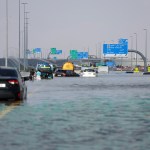RideCheck uses GPS data and sensors in drivers’ smartphones, to detect if something is going wrong during a journey.
When RideCheck is initiated, both the passenger and the driver will receive a notification asking if everything is okay. A message will pop up offering tools that can be used to get help.
You will be able to let Uber know through the app if everything is alright or, alternatively, you can take action using the emergency button or share your ride with a friend.
This feature can serve as a reminder that both the passengers and the drivers are being monitored. Uber hopes it will encourage people to report any incidents that may occur.
RideCheck will be phased in over the next month.
Uber’s safety toolkit
Uber has introduced several safety features to its app since it arrived in South Africa in 2014. Uber drivers and riders have faced continued intimidation, particularly from meter taxi drivers, which have included killings, vehicles being set alight and acid attacks.
A mobile panic button can be found in Uber’s safety toolkit, which is where the safety features are bundled together. It allows passengers to connect with the ICEplus Incident Management Centre, where a consultant will assess the nature of the incident. Third-party security officials or medical emergency specialists can be sent to the scene.
In the US, Uber and Lyft have also faced multiple lawsuits over their background checking policy and responses to assaults and sexual misconduct during rides. The companies have since also introduced additional background checks for drivers. Uber’s country manager for South Africa, Nduduzo Nyanda, says they are using tech to make travelling safer.
“This safety feature brings together many of the features we have developed over the last few years such as the safety centre, in-app emergency button, and trusted contacts. It is a great example of how tech can make travel safer than ever before, and will support our efforts to continue to prevent incidents and help set the standard for safety while travelling from A to B.”
Watching from Egypt
What many users of the service may not be aware of is that if you do report an incident to Uber, you may get a phone call from a member of Uber’s Safety Response Team in Cairo.
The team is based in Egypt in a “Centre of Excellence” which provides support for critical incidents that require immediate attention around the clock.
Uber’s 700-member team in Cairo services all of its clients across sub-Saharan Africa, including South Africa.
The ride-hailing service last month granted News24 access behind the scenes of the Cairo operation, demonstrating how its agents in the Egyptian capital interact with riders at the other end of the continent.
We were also shown a preview of the RideCheck feature and how it works in practice.
As an example of how the response centre operates, we witnessed how an agent in the centre chatted to a driver and a rider who had been involved in a bumper bashing.
In another incident, an agent demonstrated how they investigated a case in which a driver was assaulted and racially abused by a drunk passenger. The agent had to liaise with both parties before making a recommendation.
Uber says it chose to base its response team in Cairo because it gives it the advantage of centralising support and offering 24/7 help. Egypt has positioned itself in the call centre industry with several multinationals locating their services in the country, including Vodafone, Orange, Dell, HSBC, SAP and IBM.
Alon Lits, general manager of Uber for sub-Saharan Africa, says feedback from riders and drivers is they don’t mind where the Uber agent is calling from or what their accent is, as long as their issues are addressed. He says there was initially a consideration to place the response centre in South Africa, but Cairo won out.
“From a cost perspective it made more sense to invest [in Egypt]. That may change in the future depending on how the business grows and evolves over the next couple of years,” says Lits.
“South Africa needs to consider that they’re operating in a globally competitive world. So when policy makers are thinking about where are future jobs going to be created, they need to consider what regulation is in place to make sure global companies are choosing South Africa as a location rather than going to another country.”
News24



















 Become an Insider
Become an Insider